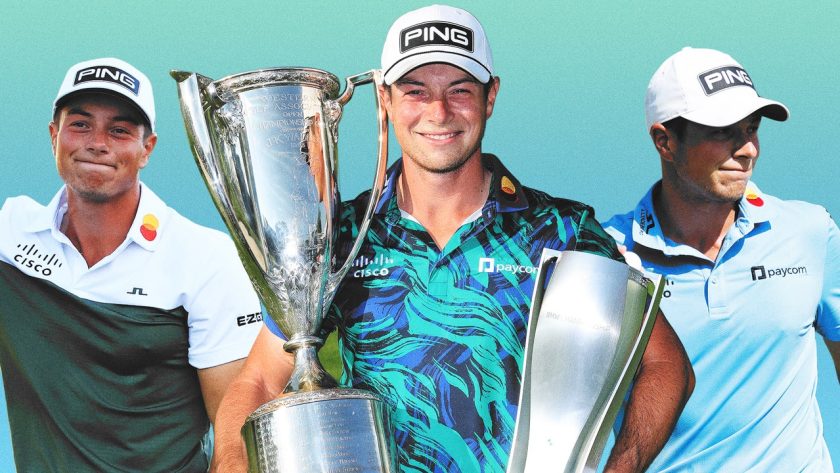It’s been a heady few weeks for Viktor Hovland. The Norwegian golfer, 25, stormed his way through the PGA Tour’s season-ending FedEx Cup playoffs, following up a 13th-place finish at the St. Jude Invitational in Memphis with back-to-back wins at the BMW Championship in Chicago and the for-all-the-marbles TOUR Championship in Atlanta this weekend. That final win brought with it a gobsmacking $18 million check—not that Hovland, as he explained to GQ, is exactly overflowing with ideas of how to spend it.
Despite his youth, Hovland has been a contender from just about the moment he joined the Tour, in 2019. And he’s done so while standing out with one of the more unique profiles in the game: he was the first Norwegian to win a PGA Tour event, and he might be the sport’s most prominent metalhead, too. And now, he’s made a strong case for his inclusion among the game’s elite: his August gave golf fans the rare chance to watch a young golfer make the leap in real time. Next month, he’ll head to Rome to compete with Team Europe in the Ryder Cup, where he’ll take on the best America has to offer. Hovland called GQ up from his hometown of Stillwater, Oklahoma, to talk about his whirlwind stretch.
GQ: So you go back to back at the last two tournaments of the year. When you come off the BMW with a win, and then you shoot a low score in the first round of the Tour Championship, are you aware that you’re feeling hot?
Viktor Hovland: It’s just one of those things. That’s why we work every day, to try to get to that point and feel like you’re playing well. And I just felt like my game was in a good spot. So when I showed up to the course every day and played a round, I was like, Okay, that was a good round, let’s do the same tomorrow. And then I just showed up the next day, I played another nice round of golf. And then I did the same thing over. Over even the last three weeks, since Memphis after the first round, I’ve played some really nice golf. And it’s not after or not until after the fact that you look back at those rounds, you’re like, Man, that’s a really nice stretch. It’s almost like playing a video game—if you’re noticing while you’re playing the game that you’ve beaten your high score, and you’re on the way to a new record, it gets to your head a little bit. And then you start making mistakes. So you just try to control the things you can control and keep going and then see how good you can really play. And then you can kind of think about what you’ve done after the fact.
When you’re rolling like that, do other golfers look at or treat you differently? What’s it like being like the hot guy on the course?
I’m just trying to focus just on the moment, and I just try to keep going. Going back to that video game analogy, it’s like, I’ve made four or five birdies in a row, whatever it is. And yeah, that’s pretty good. (But) the more you try to talk about it, it can only kind of get to your head. So I just try to keep my my head down and say, Okay, yeah, I made five birdies in a row. Let’s make six birdies in a row. And you just keep going and see how low you can go.
What’s the video game that’s in your head right now?
I’m thinking, like, the 2-D Super Mario where you’re trying to go through a maze, you know? And then you make a super far and you’re like, Oh, I haven’t seen this. Don’t screw up! And then and then of course you make a mistake, but you’re just trying to be as calm as you can and just keep going.
You start Sunday at the Tour Championship with a six-shot lead. I can see that feeling great. I can also see that feeling super stressful. How do you balance being cautious and being aggressive, knowing that you’re starting with a significant advantage like that?
Yeah, it was stressful. And I was even aware of it the day before, because we finished late on Saturday. And when I got back from the weather delay, I had a four-shot lead and I started my first two holes making two birdies. So now I had a six-shot lead. And on the last three holes, I had three very makeable birdie putts. I knew I had a six-shot lead, which is a lot—you would think that usually gets the job done. But I knew Xander (Schauffele) obviously is a great player, Collin (Morikawa) shot a 61 earlier in the week, the guys that were behind me were definitely capable of shooting something really low, and it’s not a easy golf course you can easily miss a couple tee shots. You hit it in water on the 15th or somewhere like that and you can easily shoot a couple over par. So I was like, I need these last few birdie putts to go in so I can have an eight-shot lead instead of a six-shot lead. And when I missed those last three putts I was a little upset that, you know, it was only a six-shot lead, because there’s just still so much that can that can happen.
In your press conference, you gave this very thoughtful, considered answer about the money being great, but also not meaning the world to you. To get, like, dumb and selfish for a minute, what’s one totally goofy thing you might buy now that you wouldn’t have, you know, two weeks ago?
I literally cannot think of anything, to be honest with you. Like, it’s obviously a lot of money. And it does open up some doors for sure. But it’s not like I had an unsuccessful year, or prior years, before this point. So if I would have wanted something I probably would have just bought it.
You were already in a jet ski place last month if you needed to be.
Yeah, yeah. If I wanted to do something with my life before that, I just would have gone and done it. I know it’s maybe not what you guys want to hear. But it’s all the same shit.
I know you’ve credited poker in the recent past with helping out your golf game. Can you tell me a little bit about that connection, and how those two sports interact in your world?
Obviously, everything is becoming more analytical in the world. You know, I remember watching, for example, Moneyball a few years ago, and just looking how everything is based off of stats and math and physics. You just try to use all the information at your disposal to make the best decision possible and hopefully you get the best outcome. Obviously, sometimes—most of the time—you can’t control the outcome. But if you make fundamentally sound decisions over time, you’re going to increase your likelihood of being successful. And I think that’s what’s really cool with the game of poker. All you can do is just make the best decisions possible. Sometimes you get beat, if it’s bad luck or if you made a bad decision. Well, if you made a bad decision, you try to change it, and hopefully in the future it works out. Golf is the same way. The golf ball doesn’t care about know how hard you’re working, or how many hours you slept that night. It only matters, what speed you put on the ball, where the face is pointing, and where it was hit on the face. And, you know, sometimes you get a bad bounce that’s unlucky. But the more often you can put better swings on the ball and make better decisions, you’re gonna have a better result. That’s just kind of how my mind works.
That’s a very contemporary, kind of analytical poker take, right? It’s not, like, old-school bluffing poker. This is math, science, process.
Yeah. But it’s more than that, too. I guess this is going pretty deep, but in poker most of the best players in the world try to play GTO: game theory optimal. And it almost becomes, like, where everyone does the same, or tries to become a robot. But it’s not possible for a human to play exactly GTO, so there’s gonna be deviations from that strategy. And now, if you know how people change their strategy, now you can alter your strategy to exploit their strategy. So it’s a piece of the puzzle, but there’s still room for that human part or x factor, to maximize the equity that’s still left there. And all you can do is make good rational decisions. But there’s still some decisions that you have to rely on instincts, or, or past experiences, to kind of squeeze out the last juice that’s in there, if you will.
Do you have a regular poker game? Or is this more of an academic interest?
I play a little bit online, I play a little bit in casinos, and I like to watch YouTube videos and try to study it a little bit. But I don’t have as much time, of course, to do it. But I really like the game. And when I have time, I like to get into it.
It’s going to be super exciting. We didn’t have the best go-round last time. And I haven’t experienced a Ryder Cup in Europe. So I think that that’s going to be a very different atmosphere. I think our team is looking very good. I really like our chances. I’m just super excited. And my job is to kind of try to come in in as good shape as possible and do my best and hopefully we can get the Cup back.
Do you have any early thoughts about someone you do or don’t want to be matched up against?
Not really. Obviously I want to play against the best—the guy that’s playing the best on their team. Because I want to try to play my best and still beat them. That’s just the nature of the game. I mean, how awesome would it be if Xander and I had similar rounds like we did at East Lake on Sunday in a Ryder Cup match? I mean, that’d be really, really cool.
I know you’re a metal fan. Give me heavy metal track that sums up the last couple of weeks for you
I wouldn’t say it sums up the last couple of weeks, because most of this stuff is pretty negative, pretty sad and deep stuff, where the last couple of weeks have kind of been the complete opposite of that. But I honestly haven’t listened to as much music the last year as I have in prior years, for some reason. My interests have shifted a little bit more into podcasts, or just calling my friends and hearing what they have been up to and stuff like that. But my favorite metal band still is this Swedish band. Pretty, pretty heavy stuff. It’s called Vildhjarta.
Is there a podcast you’ve been turning to over the last couple of weeks or months that has been speaking to you, or has felt interesting or meaningful during this stretch?
It’s a multitude. I’ve been listening a lot to Joe Rogan, he puts on cool guests. There’s a guy in Florida called Patrick Bet-David—he has a cool podcast, just brings in a lot of different guests, and I like to listen to different opinions. Lex Fridman has a good podcast. And I like to listen to Andrew Huberman about health and optimization and stuff like that. So always just trying to learn and listen to different viewpoints
Got to get that early morning sunlight.
Exactly.



